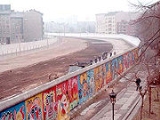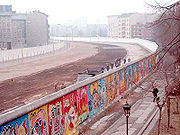
Schiessbefehl
Encyclopedia
The German
term Schießbefehl ("order to fire") was the common term to refer to Befehl 101 (Order 101), a standing order that instructed border patrols of the former German Democratic Republic (GDR or East Germany) to prevent border penetration by all means including killing the violators.
The border troops were told to avoid shooting in the direction of the territory of West Berlin
and West Germany
. Recently uncovered evidence shows that children were not immune from the order.
 After an unsuccessful escape attempt, the shooter would be rewarded and granted a special leave. Any occurrences at the border were to be kept secret. Often the soldier would be transferred to another military unit and ordered to keep silent. However, when a fugitive successfully crossed the border, disciplinary measures taken against border guards often included prison terms in the infamous military prison at Schwedt
After an unsuccessful escape attempt, the shooter would be rewarded and granted a special leave. Any occurrences at the border were to be kept secret. Often the soldier would be transferred to another military unit and ordered to keep silent. However, when a fugitive successfully crossed the border, disciplinary measures taken against border guards often included prison terms in the infamous military prison at Schwedt
. Many soldiers tried to avoid being accused of letting a fugitive escape by deliberately shooting off-target.
Each attempted or successful escape was followed by a formal investigation by the military prosecution authority and the Ministerium für Staatssicherheit (MfS, or "Ministry for State Security", better known as the Stasi
). When would-be escapees were killed, strict regulations were imposed on the family regarding the funeral; for instance, no obituaries
were to be printed in the local newspapers.
East German law only allowed crossing the border at so called Grenzübergangsstellen ("checkpoint
s"), such as the famous Checkpoint Charlie
. Elsewhere, warning signs were posted telling people not to enter the border strip. Any violation was considered a criminal act. However, these are only the formal aspects of the law. After construction of the Berlin Wall
in 1961, authorized travel by East Germans into West Germany and West Berlin was very limited; many young people were motivated to attempt a desperate flight over the inner German border. Overall, a total of about 260 people were killed attempting to cross at the Berlin Wall, at the main East-West border, or via the Baltic Sea
(though the exact number of fatalities is difficult to estimate; see Inner German border deaths). In Berlin
alone 190 people were killed in the course of 28 years. An unknown number were heavily wounded and later arrested. The last victim of the Berlin Wall was Chris Gueffroy
.
The victims of this system also include border police soldiers who were shot by fugitives.
To avoid negative press, the Schießbefehl was suspended for public holidays or state visits. Border occurrences were recorded by the Bundesgrenzschutz
(BGS or Federal Border Guard, the West German border guards), the West Berlin police and by the military police
of the Allied Forces. Files were collected in the central registration office at Salzgitter
.
, the Todesschützen (soldiers who allegedly killed fugitives) were brought to trial in the federal courts in what were known as the Mauerschützen-Prozesse (wallshooters' trial). Also, high-ranking officers of the border police and of the Nationale Verteidigungsrat (National Defense Council of the GDR) were charged in court. The verdicts generally agree that even the common soldier should have and must have recognised that the GDR border laws were so fundamentally in conflict with the International Covenant on Civil and Political Rights
, which the GDR had signed and ratified, that they were not law at all but formalized injustice, and thus the soldiers ought to have disobeyed their commanding officers.
German language
German is a West Germanic language, related to and classified alongside English and Dutch. With an estimated 90 – 98 million native speakers, German is one of the world's major languages and is the most widely-spoken first language in the European Union....
term Schießbefehl ("order to fire") was the common term to refer to Befehl 101 (Order 101), a standing order that instructed border patrols of the former German Democratic Republic (GDR or East Germany) to prevent border penetration by all means including killing the violators.
Prescribed procedure
The GDR border troops (Grenztruppen der DDR), who were not formally integrated in the regular armed forces (the Nationale Volksarmee), were instructed to follow a certain procedure when encountering persons moving illegally within the border strip:- First, to call out "Halt, stehenbleiben, oder ich schieße!" ("Stop, stand still or I will shoot").
- Next, to fire a warning shot; typically the border police carried Kalashnikov AK-47AK-47The AK-47 is a selective-fire, gas-operated 7.62×39mm assault rifle, first developed in the Soviet Union by Mikhail Kalashnikov. It is officially known as Avtomat Kalashnikova . It is also known as a Kalashnikov, an "AK", or in Russian slang, Kalash.Design work on the AK-47 began in the last year...
assault rifleAssault rifleAn assault rifle is a selective fire rifle that uses an intermediate cartridge and a detachable magazine. Assault rifles are the standard infantry weapons in most modern armies...
s. - Finally, if the fugitive failed to comply, an aimed shot, preferably aimed at the legs, was to be fired to stop the person.
The border troops were told to avoid shooting in the direction of the territory of West Berlin
West Berlin
West Berlin was a political exclave that existed between 1949 and 1990. It comprised the western regions of Berlin, which were bordered by East Berlin and parts of East Germany. West Berlin consisted of the American, British, and French occupation sectors, which had been established in 1945...
and West Germany
West Germany
West Germany is the common English, but not official, name for the Federal Republic of Germany or FRG in the period between its creation in May 1949 to German reunification on 3 October 1990....
. Recently uncovered evidence shows that children were not immune from the order.

Schwedt
Schwedt is a city in Brandenburg, Germany. It is the largest city of the district Uckermark near the Oder river on the border with Poland.-Overview:...
. Many soldiers tried to avoid being accused of letting a fugitive escape by deliberately shooting off-target.
Each attempted or successful escape was followed by a formal investigation by the military prosecution authority and the Ministerium für Staatssicherheit (MfS, or "Ministry for State Security", better known as the Stasi
Stasi
The Ministry for State Security The Ministry for State Security The Ministry for State Security (German: Ministerium für Staatssicherheit (MfS), commonly known as the Stasi (abbreviation , literally State Security), was the official state security service of East Germany. The MfS was headquartered...
). When would-be escapees were killed, strict regulations were imposed on the family regarding the funeral; for instance, no obituaries
Obituary
An obituary is a news article that reports the recent death of a person, typically along with an account of the person's life and information about the upcoming funeral. In large cities and larger newspapers, obituaries are written only for people considered significant...
were to be printed in the local newspapers.
East German law only allowed crossing the border at so called Grenzübergangsstellen ("checkpoint
Border checkpoint
A border checkpoint is a place, generally between two countries, where travellers and/or goods are inspected. Authorization often is required to enter a country through its borders. Access-controlled borders often have a limited number of checkpoints where they can be crossed without legal...
s"), such as the famous Checkpoint Charlie
Checkpoint Charlie
Checkpoint Charlie was the name given by the Western Allies to the best-known Berlin Wall crossing point between East Berlin and West Berlin during the Cold War....
. Elsewhere, warning signs were posted telling people not to enter the border strip. Any violation was considered a criminal act. However, these are only the formal aspects of the law. After construction of the Berlin Wall
Berlin Wall
The Berlin Wall was a barrier constructed by the German Democratic Republic starting on 13 August 1961, that completely cut off West Berlin from surrounding East Germany and from East Berlin...
in 1961, authorized travel by East Germans into West Germany and West Berlin was very limited; many young people were motivated to attempt a desperate flight over the inner German border. Overall, a total of about 260 people were killed attempting to cross at the Berlin Wall, at the main East-West border, or via the Baltic Sea
Baltic Sea
The Baltic Sea is a brackish mediterranean sea located in Northern Europe, from 53°N to 66°N latitude and from 20°E to 26°E longitude. It is bounded by the Scandinavian Peninsula, the mainland of Europe, and the Danish islands. It drains into the Kattegat by way of the Øresund, the Great Belt and...
(though the exact number of fatalities is difficult to estimate; see Inner German border deaths). In Berlin
Berlin
Berlin is the capital city of Germany and is one of the 16 states of Germany. With a population of 3.45 million people, Berlin is Germany's largest city. It is the second most populous city proper and the seventh most populous urban area in the European Union...
alone 190 people were killed in the course of 28 years. An unknown number were heavily wounded and later arrested. The last victim of the Berlin Wall was Chris Gueffroy
Chris Gueffroy
Chris Gueffroy was the last person to be shot while trying to escape to West Berlin across the Berlin Wall...
.
The victims of this system also include border police soldiers who were shot by fugitives.
To avoid negative press, the Schießbefehl was suspended for public holidays or state visits. Border occurrences were recorded by the Bundesgrenzschutz
Bundesgrenzschutz
Bundesgrenzschutz was the first federal police organization in Western Germany after World War II permitted by the Allied occupation authorities. In July 2005, the BGS was renamed Bundespolizei to reflect its transition to a multi-faceted police agency.It was established in 1951...
(BGS or Federal Border Guard, the West German border guards), the West Berlin police and by the military police
Military police
Military police are police organisations connected with, or part of, the military of a state. The word can have different meanings in different countries, and may refer to:...
of the Allied Forces. Files were collected in the central registration office at Salzgitter
Salzgitter
Salzgitter is an independent city in southeast Lower Saxony, Germany, located between Hildesheim and Braunschweig. Together with Wolfsburg and Braunschweig, Salzgitter is one of the seven Oberzentren of Lower Saxony...
.
After reunification
After German reunificationGerman reunification
German reunification was the process in 1990 in which the German Democratic Republic joined the Federal Republic of Germany , and when Berlin reunited into a single city, as provided by its then Grundgesetz constitution Article 23. The start of this process is commonly referred by Germans as die...
, the Todesschützen (soldiers who allegedly killed fugitives) were brought to trial in the federal courts in what were known as the Mauerschützen-Prozesse (wallshooters' trial). Also, high-ranking officers of the border police and of the Nationale Verteidigungsrat (National Defense Council of the GDR) were charged in court. The verdicts generally agree that even the common soldier should have and must have recognised that the GDR border laws were so fundamentally in conflict with the International Covenant on Civil and Political Rights
International Covenant on Civil and Political Rights
The International Covenant on Civil and Political Rights is a multilateral treaty adopted by the United Nations General Assembly on December 16, 1966, and in force from March 23, 1976...
, which the GDR had signed and ratified, that they were not law at all but formalized injustice, and thus the soldiers ought to have disobeyed their commanding officers.

